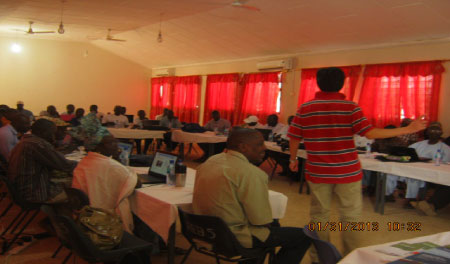
Stakeholders from extension services of Agriculture, Forestry and Fisheries sectors, as well as disaster risk management field technicians and practitioners across the country on Wednesday 30th January 2013 began a three-day intensive training of trainers on capacity re-enforcement and institutional analysis for disaster risk reduction and management in agriculture.
Held at the regional education conference hall in Janjanbureh CRR south, the programme was aimed at exposing participants to disaster risk reduction and building community capacity, to manage risks and adaptation to climate change.
Mrs. Mariatou Njie Faal, who represented FAO’s country representative, spoke at length about the exigency and importance of the forum.
While stating that Sahel region has witnessed recurrent cycles of drought and floods, she said this repeated cyclical phenomenon has significantly eroded the resilience of communities and households to shocks associated with either drought or flood and their inability to recover and restore their livelihoods before the next shock.
The agriculture sector, she said, as the main driver of economic growth, is no doubt highly vulnerable to these hazards, coupled with various agricultural risk factors that significantly contributed to low yields for major crops.
According to her, the focus on households and communities cannot be overemphasized, as empirical evidence has shown that when disasters strike, the impact is seriously felt by the communities who are closer to the disaster event.
“It is right for this reason that this particular training focuses on planning for community-based disaster risk reduction and adaptation to climate change,” she added.
It is an e-learning process highly interactive, participatory and practical in nature and is designed to provide participants with concrete procedures and steps for planning and implementing community-based disaster risk reduction strategies as a necessary pre-requisite for adaptation to climate change, she added.
For his part, Mr. Falalo M. Touray, acting deputy director general of Agriculture stated that the late erratic and unevenly distributed rainfall during the 2011/12 cropping season has led to a significant decline and low quality of agricultural production in The Gambia.
According to him, the overall crop production has dropped by 62%, compared to 2010 and by 50%, compared to the 5-year average.
Those particularly affected he noted, were key food and cash crops, such as rice (-74%), millet (-54%) and groundnut (-64%), Livestock grazing and availability of pastures.
Noting that food security had dropped from usual 6-7 months, down to average 3-4 months after the harvest, and in some of the most affected areas even below 2 months, he said farmers throughout the country experienced an early and protracted lean season.
“Out of the 39 rural districts in The Gambia, 19 districts are considered most affected by the crop failure with a total population of 428,000, including 73,802 children under the age of 5,” he revealed.
“For a more sustainable and established self-reliant resilience, the business as usual curative approach to disasters, such as humanitarian relief responses, improve sanitation, provide medical attention and shelter, prevent or minimize outbreaks of disease, support livelihoods through cash-for-work, food -for-work programmes amongst others, should be complemented and gradually replaced by preventive disaster risk reduction strategic approaches,” he suggested.
Mr. Abdoulie Bojang, the chairman of the ceremony, who spoke eloquently of the fact that climate change is a threat to food security, said planning to combat, prevent and mitigate climate change is a step in the right direction.


